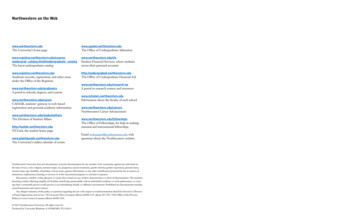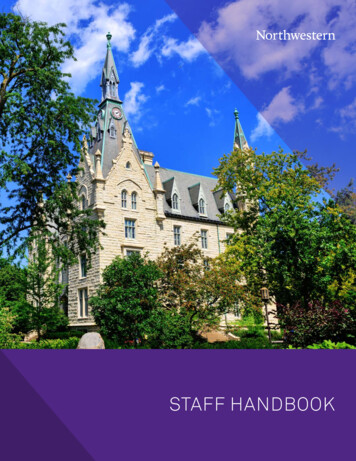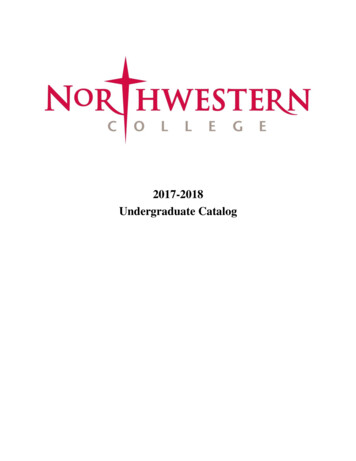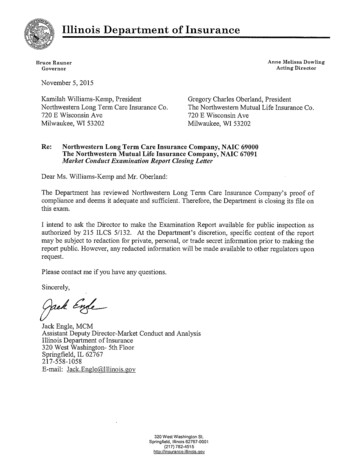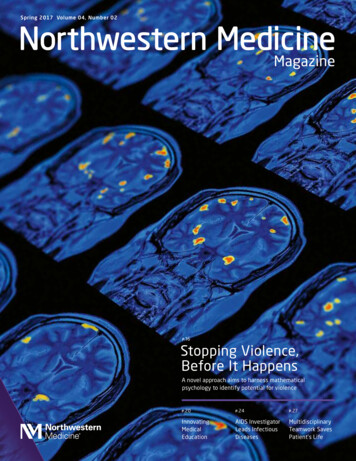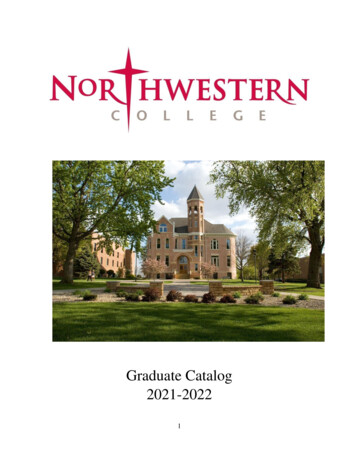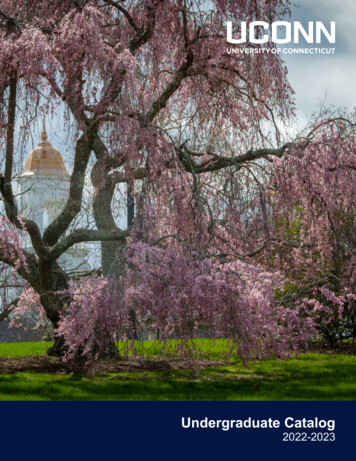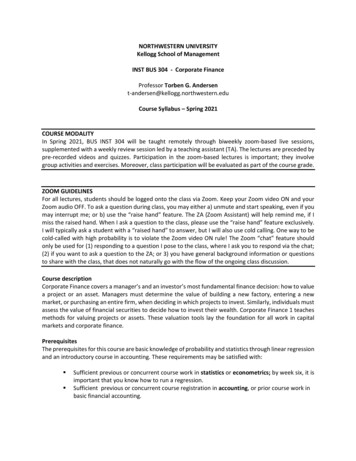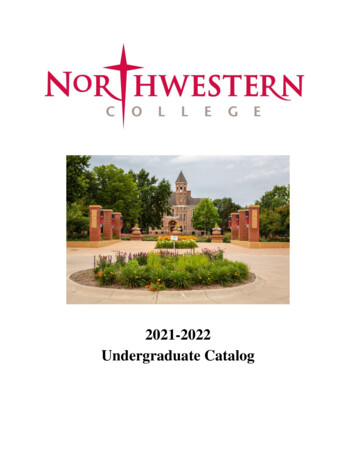
Transcription
2021-2022Undergraduate Catalog
2021-2022 Undergraduate CatalogAccreditationNorthwestern College is accredited by The Higher Learning Commission. Individual programs are accredited by the IowaDepartment of Education, the Commission on Accreditation of Athletic Training Education, the International Assembly forCollegiate Business Education, the Council on Social Work Education and the Commission on Collegiate Nursing Education.The Nursing program is approved by the Iowa Board of Nursing. Accreditation documents are located in the Office of thePresident.Catalog ChangesNorthwestern College reserves the right to change academic requirements or policies, as stated in this catalog, at the beginning ofeach term, with proper notification of such changes to be distributed to all students and faculty.Notice of nondiscriminationApplicants for admission and employment, students, parents of students, employees, sources of referral of applicants foradmission and employment and all organizations holding professional agreements with Northwestern College are hereby notifiedthat this institution does not discriminate on the basis of race, color, national origin, sex, age, or handicap in admission, access to,or employment in, its programs and activities. Any person having inquiries concerning Northwestern College's compliance withthe regulations implementing Title IX is directed to contact Deb Sandbulte, Northwestern College, Orange City, Iowa 51041(Telephone 712-707-7224). She has been designated by Northwestern College to coordinate the institution's efforts to complywith the regulations implementing Title IX. Any person having inquiries concerning Northwestern's compliance with Section 504of the Rehabilitation Act of 1973 should contact Marie Jeppesen (Telephone 712-707-7249). Any person may also contact theAssistant Secretary for Civil Rights, U.S. Department of Education, regarding this institution's compliance with Title VI, Title IXor Section 504.Table of ContentsThe Northwestern Mission . 2Academic Life . 4Registration Information . 31Financial Information . 33Northwestern Core . 47Career Concentrations . 250Pre-Professional Programs . 255Course Descriptions .149State Authorized Reciprocity .264Academic ProgramsArt. 57Biblical & Theological Studies 60Biology . 64Business . 69Chemistry . 74Christian Education . 61Communications . 76Computer Science . 79Education . 81English . 94History and Philosophy. 96Humanities .99Kinesiology .103Math .109Medical Laboratory Science . 113Modern Foreign Language . 114Music .119Nursing .125Physics .132Political Science .135Psychology .137Social Work .139Sociology and Criminal Justice .141Theatre .1441
The Northwestern mission and vision for learningMission statementNorthwestern College is a Christian academic community engaging students in courageous and faithful learning and living thatempowers them to follow Christ and pursue God's redeeming work in the world.Identity statementNorthwestern College is a Christian college in the Reformed tradition, founded in 1882 and affiliated with the Reformed Churchin America. We are committed to providing a Christian liberal arts education in the context of community among learners oncampus and online. We offer bachelor's degrees in traditional and professional programs, as well as graduate degrees andcertificate programs.Vision for learningNorthwestern College is a community rooted in Scripture and the confessions of Reformed theology and thus shaped by a robustintegrative and transformative vision of the Triune God who creates, redeems and sustains. This theological background supportsa framework within which students, staff, and faculty of various Christian traditions take up the task of loving, understanding,and serving the world whose Savior and Lord is Jesus Christ. We see the pursuit of liberal arts education as worship experiencedin community and offered to the glory of God. Embracing this calling with a freedom that arises from confidence in God's savinggrace and sovereignty, we are committed to cultivating virtues of heart and mind that will enable us to live out our sharedvocation as participants in God's redemptive work. We respond to God's call to proclaim the message of the gospel, be stewardsof creation, serve Christ in all persons, and bring all things under his lordship.In keeping with this commitment, we intend Northwestern graduates to be person whoTrust, love and worship God Understanding that God is the center of life, learning about God through careful and rigorous study, and aspiring totrust, love, and worship God as the sovereign Lord of the universe. Recognizing that to love God is also to live joyfully as participants in a variety of communities, valuing the diversity ofthe human family and seeking opportunities for learning, growth, and transformation through interculturalrelationships.Engage ideas Demonstrating competence in navigating and contributing to the world of ideas and information, having learned tolisten, read, question, evaluate, speak, write, create, and perform with a disciplined imagination. Gaining a comprehensive understanding of the theoretical foundations, methods, and products of the humanities, thesocial and natural sciences, and the fine arts. Pursuing truth faithfully in all aspects of life; developing, articulating, and supporting their own beliefs; and seekingmeaningful dialog with those holding different convictions. Desire to continue a life of learning and contemplation.Connect knowledge and experience Completing academic majors that enable acquisition of the narrower but deeper knowledge and skills that serve as thebasis for mastery of a particular discipline and as preparation for meaningful life and work. Exhibiting a broad understanding of the current and historical interplay of different realms of knowledge andexperience. Seeking opportunities for growth and reflection that integrate faith, learning, and living in community.Seeing beauty and finding joy in all pursuits.2
Respond to God's call Discerning and developing their unique gifts in service to Christ, the church, and the world Christ loves and redeems.Regarding all persons as made in the image of God and thus deserving of understanding, love, and justice.Living a balanced and whole life in obedience to God.Northwestern heritageA brief history of Northwestern CollegeNorthwestern is a Christian college in the Reformed tradition. That tradition goes back to the 16th-century ProtestantReformation and to the work of John Calvin. Calvinist churches spread throughout continental Europe and the rest of the Englishspeaking world, including North America, where their best-known representatives have been the Puritans and the Presbyterians.Reformed Christianity was the dominant religious influence in colonial America. In the early 17th century, Dutch Calvinistimmigrants settled in what is now New York, where the first Reformed Church was organized in 1628. This makes the ReformedChurch in America, Northwestern's founding denomination, the oldest Protestant denomination in North America with acontinuous ministry.A second Dutch migration to the New World-this time to the Midwest in the 19th century-brought immigrants who desiredfreedom of religious expression and opportunities for a better life in general. The best-known settlements of the Dutch Reformedimmigrants of this time were Holland, Michigan, and Pella, Iowa, both begun in 1847. Most of these immigrants soon joined theReformed Church in America. In the 1870s some Pella residents, led by Henry Hospers, moved to inexpensive, fertile land innorthwestern Iowa, about forty miles north of Sioux City. They named their main settlement Orange City, after the Dutch royalhouse.In 1872, the Reverend Seine Bolks became the first pastor of Orange City's First Reformed Church. One of the founders of whatbecame Hope College in Holland, Michigan, he desired to establish a Christian classical academy in Orange City to preparestudents for college and ultimately for ministry in the Reformed Church in America. Grasshopper scourges and intermittentfloods, hailstorms and droughts delayed fulfillment of that dream. After considerable economic hardship, the area's DutchReformed people, led by Bolks and Hospers, incorporated the Northwestern Classical Academy on July 19, 1882, with the motto"Deus est lux" (God is light). The constitution called for establishing an institution of learning "for the promotion of science andliterature in harmony with, and religion as expressed in, the doctrinal standards of the Reformed Church in America."Hospers donated much of the land on which Northwestern is located. Zwemer Hall, the first permanent building, was erected in1894; it is now the college's administration building and is listed in the National Register of Historic Places.The academy grew from 25 students in the first year to around 70 within a decade. The curriculum expanded to embrace subjectssuch as education and business in addition to classical studies such as Latin. Soon academy graduates included educators andother professionals.In 1928 the academy added a junior college. The Great Depression hit Northwestern hard, resulting in salary cuts for faculty.Despite the suggestion from the Reformed Church's Board of Education in 1932 that the junior college close temporarily,President Jacob Heemstra kept Northwestern afloat. After World War II, enrollment increased steadily. With that growth camethe construction of a number of buildings in the 1950s.Northwestern became a four-year teacher-training college, awarding its first bachelor's degrees in 1961, the same year theacademy ceased operation. Four years later, the Board of Trustees approved the development of a liberal arts program. Asenrollment doubled to more than 760 in the 1960s, three dorms and Ramaker Library were built.The North Central Association granted the college full accreditation in 1970. The football team won the college's first NAIAnational championship in 1973, and Northwestern began offering opportunities to intern in Chicago and study abroad a year later.Northwestern's Christian dimension was strengthened in the 1980s as the institution joined the Council for Christian Colleges &Universities, began offering spring and summer short-term mission opportunities, and emphasized discipleship groups. The3
percentage of faculty who earned doctorates or the highest degree in their field increased from less than 50% to 75%. In addition,majors were added in accounting, Christian education, communication, computer science and social work. Despite Iowa's farmcrisis, funds were raised to build Christ Chapel and enrollment grew to more than 1,000 by the end of the decade.A number of building and renovation projects were completed by the end of the 20th century, and enrollment continued a steadyincline. Northwestern's academic reputation was strengthened when faculty members were named Iowa's Professor of the Year in2004 and 2006. The 2000s also saw an expansion of the study abroad program, construction of new facilities for art and theatre,five national championships in men's and women's basketball, and a campus-wide emphasis on helping students discover theircalling by better integrating their academic, service and co-curricular experiences.Adhering to its original mission of providing a Christ-centered education and still strongly connected to the Reformed Church inAmerica, Northwestern has achieved recognition as a high-quality, genuinely Christian, liberal arts college. As in the past,Northwestern looks to the future with confidence and faith that God's light will continue to guide.Northwestern and the liberal artsNorthwestern College claims the liberal arts tradition as its own. That tradition can trace its roots to ancient Rome and Greece,continuing through the Middle Ages in studies designed to develop the human intellect, with the focus on knowledge, reflectionand understanding. The seven liberal arts originally included arithmetic, astronomy, geometry, grammar, logic, music andrhetoric. The Renaissance added the ancient languages and the classics, along with a new emphasis on the dignity of theindividual. With the Reformation, theology and scriptural studies became central, and people were called upon not only to knowGod but also to serve him.The scientific revolution and the Enlightenment ushered in a renewed interest in the natural world and a new approach to truththat stressed experience, observation and human reason. These developments brought both benefits and problems. Perhaps chiefamong the latter was the Enlightenment tendency to ignore the Christian theological presuppositions that informed previousintellectual efforts. Even Christian colleges have felt these effects, although many have remained committed to a Christ-centeredview of life and to the important role of the liberal arts in developing such a view.Throughout the development of the liberal arts tradition, the major purposes have been to understand the human and the humane;to liberate and enlarge the intellect; to develop, through study and contemplation over time, habits of thought and commitmentthat become part of a comprehensive world view; and to refine basic and liberating skills such as communication, criticalthinking and decision-making. As a liberal arts college, infused with a distinctively Christian perspective, Northwestern seeks toteach and to practice the unity and universality of God's truth. Foundational to a Northwestern College education is our NWCoregeneral education program. NWCore includes a First-Year Seminar, Core Courses in biblical and theological studies, a menu ofcourses in ten Integrative Learning Categories, and a Senior Seminar. Along with this solid foundation, Northwestern offersmajors and professional programs that seek to broaden and deepen the understanding of truth, beauty and justice, and to preparestudents for lives of service and work to the glory of God.Academic requirementsDegree requirementsThe Bachelor of Arts or Bachelor of Science degree is granted to students who:1.2.3.4.Complete the general education requirements as listed in the Northwestern Core section of this catalog.Complete an academic major as described later in this section.Complete a minimum of 124 semester credits.Achieve a minimum cumulative GPA of 2.00 in all course work attempted at Northwestern College and a minimumGPA of 2.00 in the courses comprising the major. Exceptions to the requirement of a cumulative 2.00 GPA will bemade for programs in which an outside accrediting organization mandates a higher GPA (for example, athletic training,nursing, etc.).4
5.6.Fulfill the residence requirement as described later in this section.Fulfill chapel attendance requirement.Student responsibilityWhile the faculty adviser participates actively in the student's academic planning and monitors his/her progress, finalresponsibility for recognizing and fulfilling graduation requirements rests with the student. Students should acquaint themselveswith the various requirements set forth in this catalog and, beginning with their freshman year, should plan their college coursesso as to fulfill their graduation requirements.Major requirementsEach student is required to choose one academic major. The major enables the student to pursue in-depth study in one academicdepartment. Students must have a minimum grade point average of at least 2.00 in the courses comprising their major forgraduation. Students are required to file a Declaration of Academic Major form in the registrar's office by the end of thesophomore year, prior to registering for classes as a junior. Sophomores registering for their junior term will be unable to registerfor classes until a form is on file in the registrar's office. See the section on college courses for descriptions of all availablemajors.The number of credits that a student must take to meet the requirements for an academic major generally ranges between 28 and36, depending on the major. All majors must require students to take a minimum of 12 credits of 300-level or above courses,excluding cognates.A student may not use more than 8 credits of the same course work between a double major or a major and a minor. This limitdoes not pertain to cognate requirements.A minimum of one-half of major courses comprising an academic major, excluding cognates, must be completed in residency.(Note: Student may petition the respective Department Chair for an exception to this rule).Academic minorsNorthwestern College offers approximately forty academic minors, constituting a disciplinary area in which a student wishes toreceive a broad introduction to complement their choice of major. Academic minors must include a minimum of 20 credits. Therecan be an overlap of no more than 8 credits with a student's academic major, not counting cognate courses. As with academicmajors, a student cannot elect a pass/no pass option for courses in their minor. All course substitutions affecting the minor mustbe approved by the department offering the minor. A minimum of one-half of the academic minor courses, excluding cognates,must be completed in residency. No one may propose a student initiated minor.Free elective coursesIn addition to meeting Integrative General Education and major requirements, the student generally has a number of free electivecredits available in the 124-credit total (depending on choice of major). The student may use these free elective credits inaccordance with his or her own interests. In some cases a second major can be chosen, or a minor area of study may be elected(see the sections on college courses for descriptions of all available minors). The student may also use these free elective creditsto pursue a pre-professional program or a career concentration (see the sections on pre-professional programs and careerconcentrations for descriptions of available options).A student may not use more than 8 credits of the same course work between a double major or a major and a minor. This limitdoes not pertain to cognate requirements.5
Course substitutionsAll course substitutions intended to meet Northwestern Core requirements must be approved by the student's advisor and theregistrar, in consultation with the Director of the Northwestern Core. All student course substitutions intended to meet therequirements of a major or minor must receive the written approval of the student, the faculty adviser, the departmentchairperson, and the registrar. The written approval must be filed with the registrar before the start of the student's last term priorto graduation. Forms for these course substitutions are available in the registrar's office.Academic calendarNorthwestern's academic calendar consists of two 16-week terms.Course loadA student must be enrolled in 12 credit hours of coursework, taken for academic credit, to be considered full-time. (Auditedcredit hours do not count toward meeting this requirement.)The maximum number of credits that a student may take during a given term is 18*. Exceptions for an overload may be granted ifthe student has the following cumulative GPA:3.30 when registering for the sophomore year3.15 when registering for the junior year3.00 when registering for the senior yearFreshmen are not eligible for an academic overload*Audit credits are not included when approving course overloads beyond 18 credits.Residence requirementStudents who transfer 30 or more credits to Northwestern must complete the residence requirement by taking their last 30 creditsat Northwestern. Before enrolling in course work at another institution, students must receive prior approval from the registrar.Exception to this residence requirement is made for students majoring in medical laboratory science; students in the dual-degreeprogram in chemistry/engineering or math/ engineering; and students in selected pre-professional programs in physical therapy,dentistry, medicine, optometry, and veterinary medicine where the professional school accepts students after three years providedtheir undergraduate institution will award them the B.A. degree following completion of the first year of their professionaltraining.Academic appealsStudents who wish to appeal academic program decisions or the decisions of a faculty member or an academic departmentconcerning their academic progress must submit to the vice president for academic affairs a written appeal of the decision within30 days following their notification of the decision. The vice president for academic affairs will provide a writtenacknowledgment of the appeal within seven days. The vice president for academic affairs will investigate the appeal and providea decision which will be communicated in writing to the student within 15 days of this acknowledgment. This decision will befinal.Individualized courses and programsNorthwestern values the individuality of each of its students and therefore provides the following individualized courses andprograms as a complement to the regular college curriculum.6
Honors programMission, goals and outcomesThe mission of the NWC Honors Program is to provide support for students who want to explore what it means to become aChristian scholar.The program's goals are to: Reward intellectual curiosity-through limited enrollment courses, financial benefits, travel opportunities, and extracurricular events that bolster community Foster interdisciplinary collaboration-through a core curriculum that bridges the gaps between multiple disciplines,faculty contributions from multiple departments, and an optional Summer Study Abroad course Enhance disciplinary expertise-through honors components within existing courses required for a student's major, ascholarship methods course, and an independent scholarly project appropriate to the student's disciplineStudents who have completed the requirements of the Honors Program will be able to:1. Collaborate across disciplinary lines in order to address cross-disciplinary topics2. Conduct independent scholarly work appropriate to their discipline3. Embrace scholarship as a means of pursuing God's redeeming work in the worldRequired academic aspects of the program:Honors NWCore curriculumThe Honors NWCore curriculum is comprised of a series of courses taught on a regular rotation that are open only to studentswho are members of the Honors Program. A distinguishing characteristic of these courses is their interdisciplinary nature. Notonly do they focus on broad, foundational topics that overlap with multiple disciplines, they have been designed to fulfill theobjectives of more than one NWCore category. Students are then allowed to choose which of these NWCore categories theywould like the course to fulfill.Each course in the curriculum will include at least one collaborative assignment which fosters interdisciplinary dialogue. Thenature of the assignment will vary from course to course, provided that the assignment meets the following parameters: Time in class must be devoted to small or full-group discussion of an issue that crosses disciplinary boundaries.Guidelines for the assignment must direct students to approach the issue from more than one disciplinary perspective.The assignment should include some form of peer editing/review.Multidisciplinary reflection/practice must compose a substantial part (at least 20%) of the overall assignment grade.Note: This assignment may include, but does not require, a "group" grade. The method and criteria of evaluation areleft up to the discretion of the instructor.Honors components within existing coursesAcademic culture, broadly speaking, relies heavily upon the notion that students will meet the expectations of assignedcoursework. Honors components within existing courses reinforce the value of exceeding expectations in the development ofdisciplinary expertise. Students will choose one upper division (numbered 300 or higher) course required for their major and, inconsultation with the instructor of that course, formulate a way to exceed the expectations of one particular assignment. Thefollowing guidelines provide parameters while ensuring a high degree of freedom in implementation: The method of exceeding assignment expectations will be student initiated and instructor, department chair and thehonors director(s) approved. The method may be quantitative, qualitative, or creative in nature, depending on what is appropriate to the assignmentand discipline. The honors component added to the existing assignment should be significant (the definition of "significant" is left tothe discretion of the instructor) without being disproportionate to the assignment itself.7
The assignment chosen must represent a significant portion of the course grade (e.g., approximately 20%; if preferred,a collection of smaller assignments can be substituted for a single, larger assignment.) No change will be made to theweight of the assignment relative to the rest of the course requirements.Exceeding assignment expectations does not guarantee a high grade on the assignment; as always, grading is at the discretion ofthe instructor. The student and the instructor should discuss grading expectations prior to the completion of the assignment.Honors scholarshipHonors Scholarship involves the completion of an advanced-level, independent project that reflects strong intellectual andtechnical work appropriate to the student's discipline. The student will work with a 3-member faculty panel headed up by aprimary faculty advisor. The project should make an original contribution to the field and will take a form that is representative ofwork done in that field (examples include a substantial research paper, extensive experimentation and collection of data, originalartwork, etc.). Upon completion of the Honors Scholarship project, the student will give a formal, public presentation open to allmembers of the NWC community.In order to be approved for Honors Scholarship, the student must:1.2.3.4.Be a junior or senior during the time completing the proposed scholarship.Have a minimum GPA of 3.5 in his or her major.Have successfully completed HON498: Honors Scholarship Methods course prior to beginning scholarship.Propose the number of credits awarded for their proposed scholarship. Honors Scholarship may be taken for 2 to 4credits. The credit hours proposed for Honors Scholarship will depend on the nature of the project.5. Organize a scholarship panel. This panel will include the student's scholarship advisor, one of the honors directors andat least one other faculty member. The role of this panel is to approve the quality of the scholarship proposed, agree tothe appropriate number of credits awarded to the project, mentor the student during their work and evaluate whether theproject is acceptable or unacceptable upon completion.6. Receive final approval from (once approved by the scholarship panel) the Academic Dean. This must take place at leastthree weeks prior to the term in which the research is to begin.A copy of each proposal and project will be catalogued by the Honors Program. These will be made available to future Honorsstudents.Optional academic aspects of the program:NWC105: Honors First-Year SeminarNWC105 is a course in place that allows potential Honors Scholars to experience a strong academic community. It functions asan Honors section of the First-Year Seminar, utilizing the same syllabus, texts, and course objectives as NWC101. In addition,the Honors First-Year Seminar aims: 1) to promote community among first-year students of demonstrated academic ability; 2) tocreate an environment in which these students can excel academically and nurture their innate intellectual curiosity; and 3) toprovide students with an opportunity to learn from NWC faculty who have been recognized for their teaching excellence in theclassroom. Prospective students are invited to enroll based on their high school academic records. Completion of the HonorsFirst-Year Seminar does not guarantee, nor is it required for, admission into the Honors Program. Students will have theopportunity to apply to the Honors Program in the second term of their freshman year.Honors summer study abroadIn conjunction with the Global Education Center, the Honors Program currently sponsors a 3-week travel experience in Greece,where honors students are given the opportunity to explore the roots of western culture and their own academic discipline. TheHonors SSA is optional, but participants earn four academic credits and fulfill the NWCore Cross Cultural Engagementrequirement through this opportunity.Additional aspects of the program The program occasionally sponsors events such as graduate school visits and workshops to assist students who arepursing post-graduate education.8
The program administers two financial scholarships, which are awarded based on financial need and academicachievement. The program will provide limited reimbursement of fees incurred while pursuing scholarship beyond NWC. Studentswho are presenting papers at conferences may r
3 Respond to God's call Discerning and developing their unique gifts in service to Christ, the church, and the world Christ loves and redeems. Regarding all persons as made in the image of God and thus deserving of understanding, love, and justice. Living a balanced and whole life in obedience to God. Northwestern heritage A brief history of Northwestern College
